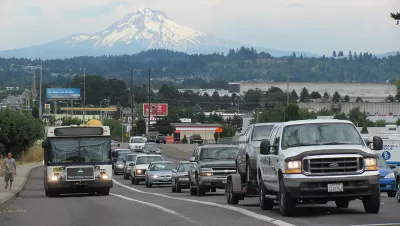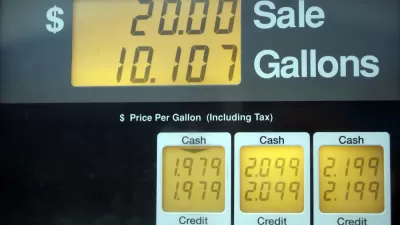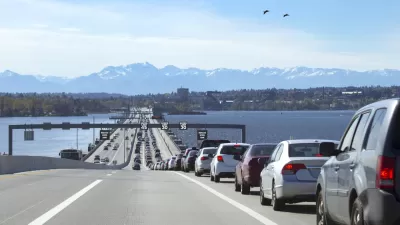Oregon was the first to conduct a pilot program in 2006, followed by California and Colorado last year. With financial backing from the U.S. DOT, at least four more states are exploring charging by the mile driven rather than the fuel burned.

What's propelling the movement toward mileage-based user fees is the declining power of fuel taxes, exacerbated by the reluctance of the federal government and many state governments to hike gas taxes that literally haven't been raised in decades as road costs mount steadily and motorists continue to drive more miles.
“There’s a growing understanding that we’re going to have to move to a mileage-based system at some point,” Lee Munnich, a senior fellow at the State and Local Policy Program at the University of Minnesota, tells Daniel C. Vock, Governing’s transportation and infrastructure reporter, in his article on Jan. 16.
The U.S. Department of Transportation (USDOT) awarded $14 million in September 2016 to eight pilot projects to test alternative means to fund transportation. All but one was based on mileage-based user fees, also called vehicle miles traveled (VMT) fees or road usage charges.
Vock reports on the progress of California which completed a 9-month pilot last March involving over 5,000 participants.
The state’s report [pdf] on the pilot found that the options with the best privacy protections – like odometer checks – would also be the hardest to enforce. The most reliable methods for tracking mileage were plug-in devices (that fit into a ports in vehicles that are often used by mechanics to diagnose mechanical problems). But those devices are also likely to be obsolete by the time any widespread mileage fee could be imposed.
“Nothing is as easy as what we have today,” says Norma Ortega, the chief financial officer for the California Department of Transportation.
The Golden State did just increase its gas tax by 12-cents per gallon on Nov. 1, the first increase since 1994, but a potential voter backlash threatens to repeal it next November.
Colorado completed a much smaller pilot project than California's last April, and hopes to continue with another pilot after receiving positive feedback from most of the 150 volunteers. The Colorado Department of Transportation is looking at a "$1 billion-a-year budgetary shortfall for the next 10 years, largely because an expected decline in gas taxes," noted John Aguilar of The Denver Post on Dec. 12, 2017 in his report on the pilot project. The state's low gas tax of 22 cents per gallon hasn't changed for 27 years.
"Minnesota is exploring the idea of imposing taxes on transportation companies like Uber and Lyft, rather than individual drivers," adds Vock. "Missouri explored adjusting its vehicle registration fees to reflect their fuel efficiency, and it is now getting public feedback on equity and data security issues."
Washington is now recruiting 2,000 drivers to participate in the Washington Road Usage Charge Pilot Project.
The Hawaii Road User Fee Demonstration was is expected to have the largest participation of any pilot. A comprehensive paper [pdf] was released Oct. 6, 2017.
Oregon update
Oregon, the undisputed leader in the movement toward road usage charges, established by state legislation a Road User Fee Task Force in 2001. It "selected a per-mile fee as the best alternative to fuels tax and conducted two pay-per-mile pilot programs in 2006 and 2012," notes the executive summary of OReGO Program final report [pdf], April 2017 on the Road Usage Charge.
The state has run an actual program since July 2015, mandated by state legislation, with participants paying 1.5 cents per mile driven within Oregon after having their state gas taxes credited.
The gas tax legislation that was signed by Gov. Kate Brown last August establishes a path toward transitioning from the current, voluntary road usage charge program known as OReGO to a compulsory program limited to vehicles that do not run on gasoline or diesel fuel.
In addition to hiking gas taxes by 10 cents per gallon, HB 2017 also establishes an annual registration fee of $110 for electric vehicles (EVs), an increasing common way to charge EVs for road maintenance as they pay no gas taxes. [For latest post on EV and hybrid fees, see "New Hampshire Bills Target Vehicles That Don't Guzzle Enough Fuel," Jan. 5.]
FULL STORY: With Gas Taxes in Peril, More States Study Alternatives

Maui's Vacation Rental Debate Turns Ugly
Verbal attacks, misinformation campaigns and fistfights plague a high-stakes debate to convert thousands of vacation rentals into long-term housing.

Planetizen Federal Action Tracker
A weekly monitor of how Trump’s orders and actions are impacting planners and planning in America.

In Urban Planning, AI Prompting Could be the New Design Thinking
Creativity has long been key to great urban design. What if we see AI as our new creative partner?

Pedestrian Deaths Drop, Remain Twice as High as in 2009
Fatalities declined by 4 percent in 2024, but the U.S. is still nowhere close to ‘Vision Zero.’

King County Supportive Housing Program Offers Hope for Unhoused Residents
The county is taking a ‘Housing First’ approach that prioritizes getting people into housing, then offering wraparound supportive services.

Researchers Use AI to Get Clearer Picture of US Housing
Analysts are using artificial intelligence to supercharge their research by allowing them to comb through data faster. Though these AI tools can be error prone, they save time and housing researchers are optimistic about the future.
Urban Design for Planners 1: Software Tools
This six-course series explores essential urban design concepts using open source software and equips planners with the tools they need to participate fully in the urban design process.
Planning for Universal Design
Learn the tools for implementing Universal Design in planning regulations.
planning NEXT
Appalachian Highlands Housing Partners
Mpact (founded as Rail~Volution)
City of Camden Redevelopment Agency
City of Astoria
City of Portland
City of Laramie





























